#in case that's not evident
Photo
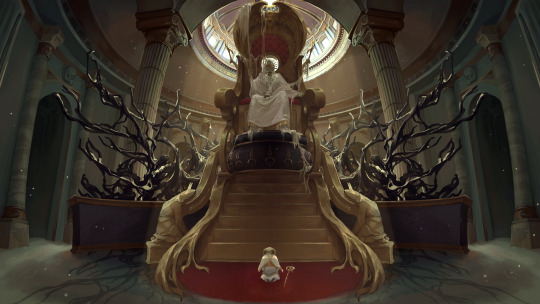

- devotion -
The first key scene illustration from last year’s Divine Decay uni project, featuring Petr (will share soon!) receiving his missive from the Voice of the Spore 🍄✨
#painting#mushroom people#illustration#concept art#fantasy#divine decay#the voice of the spore is the fucked up mushroom pope#in case that's not evident#art#digital art
33 notes
·
View notes
Text
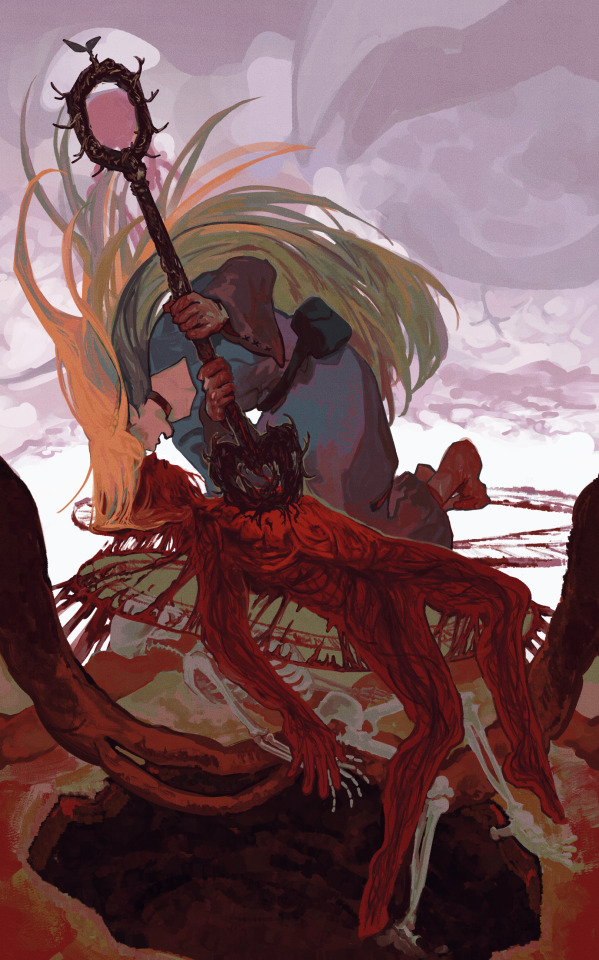
dragon meat, you, and me
#marcille donato#falin touden#farcille#dungeon meshi#delicious in dungeon#tw blood#tw body horror#tw gore#as a normal farcille fan this revival has been on my mind since i first read it and getting to watch it is like yippee!!#like messy revivals are everything - the consequences that will haunt u for the rest of the time they are alive#the initial hopeful moments where it all seemed well but quickly descend to That not being the case - losing not only the bit of evidence#evidence that your dream may work out but also someone you deeply care about in the process… marcille my Beloved#ofc wholly thruout the journey - at the forefront of it - getting falin back was the most crucial point but so wuickly :(( it was lost#on the other end its crazy to think about the compoments of falin now - human - dragon (dungeon) - marcille’s magic and desperation#the food the crew cooked (digested) - she is made of many parts!!#also i did not realize how medical it feels to draw smth like this. i dont usually explore the inner parts or use a lot of blood#in my work so rendering everything and looking up refs it felt quite magical (?)#ruporas art
12K notes
·
View notes
Text
I feel a lot of belief that “trans women obviously have it worse than trans men” it comes from assuming men & women are opposites & that their experiences must be opposite as well. As in, if trans women experience one thing, trans men must experience the opposite—but that’s not how it works in practice. Trans women are demonized and sexualized doesn’t mean trans men aren’t as well. Trans women feeling less safe after transition doesn’t mean trans men feel more safe. And transmasculinity being considered disgusting mutilation doesn’t translate to the opposite for transfemininity! I just wish we would stop comparing experiences as though they can be quantified & pitted against one another.
#not in all cases of course it’s just something I noticed a lot in whipping girl#she kept making claims about transmasculine experiences on little to no actual evidence to contrast with transfem experiences#to support the idea that trans women don’t just have it bad - they have it THE worst#that’s been my experience with the book so far at least which sucks bc I went into it really liking Serano and being excited#transandrophobia#transphobia#intracommunity issues tag#mine
1K notes
·
View notes
Text
Very interesting to me that a certain subset of the BES fandom's favourite iterations of Mizu and Akemi are seemingly rooted in the facades they have projected towards the world, and are not accurate representations of their true selves.
And I see this is especially the case with Mizu, where fanon likes to paint her as this dominant, hyper-masculine, smirking Cool GuyTM who's going to give you her strap. And this idea of Mizu is often based on the image of her wearing her glasses, and optionally, with her cloak and big, wide-brimmed kasa.
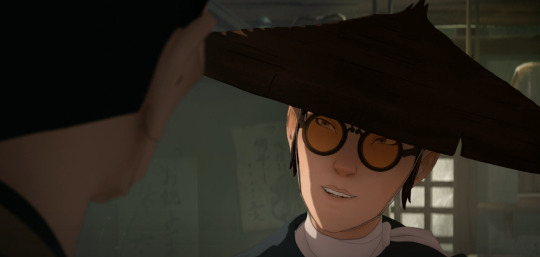

And what's interesting about this, to me, is that fanon is seemingly falling for her deliberate disguise. Because the glasses (with the optional combination of cloak and hat) represent Mizu's suppression of her true self. She is playing a role.

Take this scene of Mizu in the brothel in Episode 4 for example. Here, not only is Mizu wearing her glasses to symbolise the mask she is wearing, but she is purposely acting like some suave and cocky gentleman, intimidating, calm, in control. Her voice is even deeper than usual, like what we hear in her first scene while facing off with Hachiman the Flesh-Trader in Episode 1.
This act that Mizu puts on is an embodiment of masculine showboating, which is highly effective against weak and insecure men like Hachi, but also against women like those who tried to seduce her at the Shindo House.
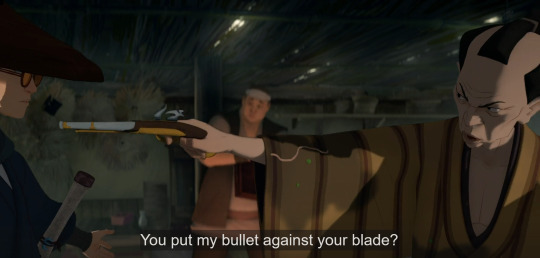

And that brings me to how Mizu's mask is actually a direct parallel to Akemi's mask in this very same scene.
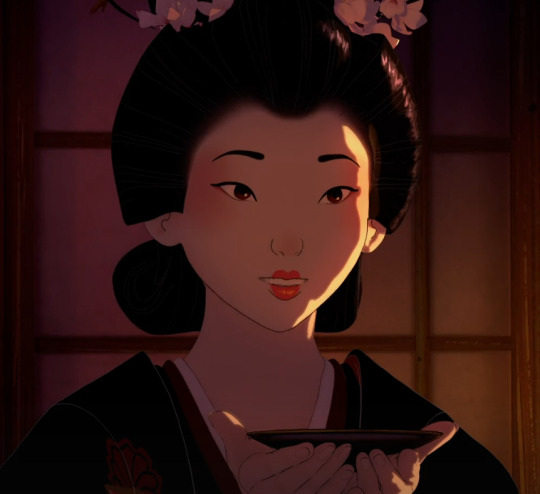
Here, Akemi is also putting up an act, playing up her naivety and demure girlishness, using her high-pitched lilted voice, complimenting Mizu and trying to make small talk, all so she can seduce and lure Mizu in to drink the drugged cup of sake.
So what I find so interesting and funny about this scene, characters within it, and the subsequent fandom interpretations of both, is that everyone seems to literally be falling for the mask that Mizu and Akemi are putting up to conceal their identities, guard themselves from the world, and get what they want.
It's also a little frustrating because the fanon seems to twist what actually makes Mizu and Akemi's dynamic so interesting by flattening it completely. Because both here and throughout the story, Mizu and Akemi's entire relationship and treatment of each other is solely built off of masks, assumptions, and misconceptions.
Akemi believes Mizu is a selfish, cocky male samurai who destroyed her ex-fiance's career and life, and who abandoned her to let her get dragged away by her father's guards and forcibly married off to a man she didn't know. on the other hand, Mizu believes Akemi is bratty, naive princess who constantly needs saving and who can't make her own decisions.
These misconceptions are even evident in the framing of their first impressions of each other, both of which unfold in these slow-motion POV shots.
Mizu's first impression of Akemi is that of a beautiful, untouchable princess in a cage. Swirling string music in the background.
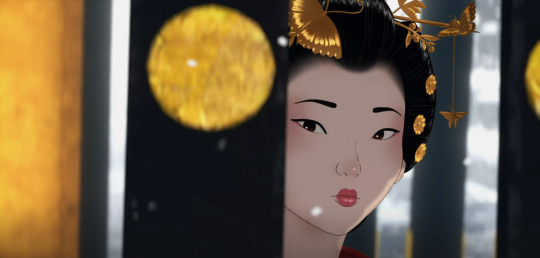
Akemi's first impression of Mizu is of a mysterious, stoic "demon" samurai who stole her fiance's scarf. Tense music and the sound of ocean waves in the background.

And then, going back to that scene of them together in Episode 4, both Mizu and Akemi continue to fool each other and hold these assumptions of each other, and they both feed into it, as both are purposely acting within the suppressive roles society binds them to in order to achieve their goals within the means they are allowed (Akemi playing the part of a subservient woman; Mizu playing the part of a dominant man).
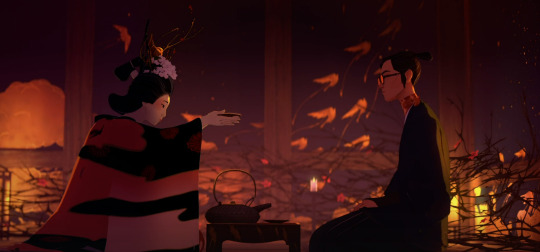
But then, for once in both their lives, neither of their usual tactics work.
Akemi is trying to use flattery and seduction on Mizu, but Mizu sees right through it, knowing that Akemi is just trying to manipulate and harm her. Rather than give in to Akemi's tactics, Mizu plays with Akemi's emotions by alluding to Taigen's death, before pinning her down, and then when she starts crying, Mizu just rolls her eyes and tells her to shut up.
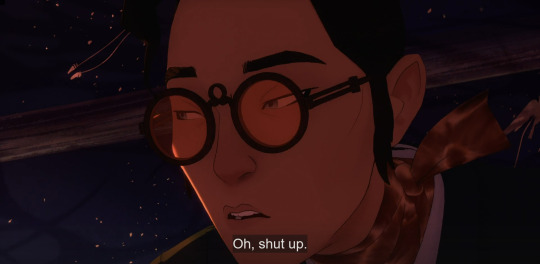
On the opposite end, when Mizu tries to use brute force and intimidation, Akemi also sees right through it, not falling for it, and instead says this:
"Under your mask, you're not the killer you pretend to be."
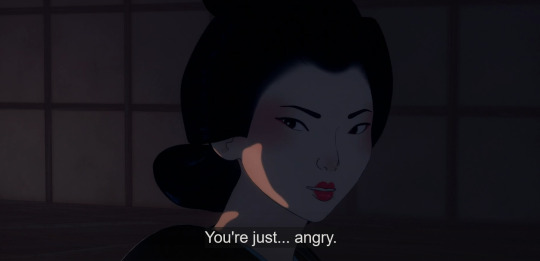
Nonetheless, despite the fact that they see a little bit through each other's masks, they both still hold their presumptions of each other until the very end of the season, with Akemi seeing Mizu as an obnoxious samurai swooping in to save the day, and Mizu seeing Akemi as a damsel in distress.
And what I find a bit irksome is that the fandom also resorts to flattening them to these tropes as well.
Because Mizu is not some cool, smooth-talking samurai with a big dick sword as Akemi (and the fandom) might believe. All of that is the facade she puts up and nothing more. In reality, Mizu is an angry, confused and lonely child, and a masterful artist, who is struggling against her own self-hatred. Master Eiji, her father figure who knows her best, knows this.
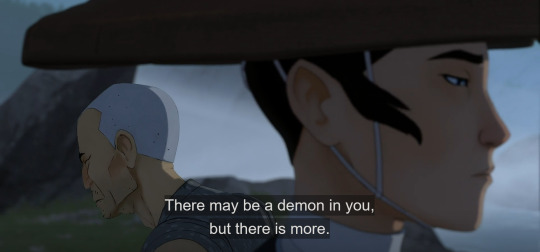
And Akemi, on the other hand, is not some girly, sweet, vain and spoiled princess as Mizu might believe. Instead she has never cared for frivolous things like fashion, love or looks, instead favouring poetry and strategy games instead, and has always only cared about her own independence. Seki, her father figure who knows her best, knows this.
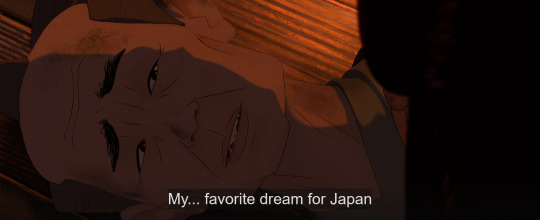

But neither is she some authoritative dominatrix, though this is part of her new persona that she is trying to project to get what she wants. Because while Akemi is willful, outspoken, intelligent and authoritative, she can still be naive! She is still often unsure and needs to have her hand held through things, as she is still learning and growing into her full potential. Her new parental/guardian figure, Madame Kaji, knows this as well.
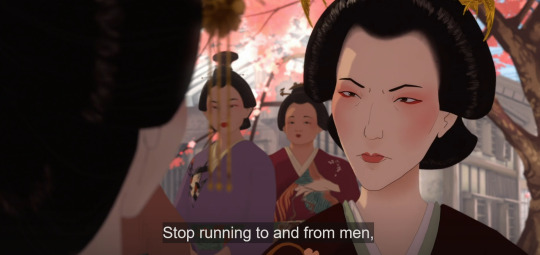
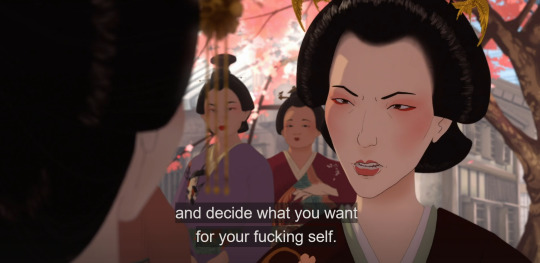
So with all that being said, now that we know that Mizu and Akemi are essentially wearing masks and putting up fronts throughout the show, what would a representation of Mizu's and Akemi's true selves actually look like? Easy. It's in their hair.
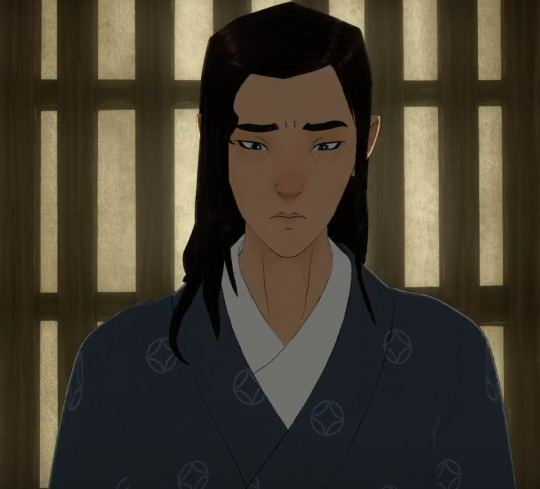

This shot on the left is the only time we see Mizu with her hair completely down. In this scene, she's being berated by Mama, and her guard is completely down, she has no weapon, and is no longer wearing any mask, as this is after she showed Mikio "all of herself" and tried to take off the mask of a subservient housewife. Thus, here, she is sad, vulnerable, and feeling small (emphasised further by the framing of the scene). This is a perfect encapsulation of what Mizu is on the inside, underneath all the layers of revenge-obsession and the walls she's put around herself.
In contrast, the only time we Akemi with her hair fully down, she is completely alone in the bath, and this scene takes place after being scorned by her father and left weeping at his feet. But despite all that, Akemi is headstrong, determined, taking the reigns of her life as she makes the choice to run away, but even that choice is reflective of her youthful naivety. She even gets scolded by Seki shortly after this in the next scene, because though she wants to be independent, she still hasn't completely learned to be. Not yet. Regardless, her decisiveness and moment of self-empowerment is emphasised by the framing of the scene, where her face takes up the majority of the shot, and she stares seriously into the middle distance.
To conclude, I wish popular fanon would stop mischaracterising these two, and flattening them into tropes and stereotypes (ie. masculine badass swordsman Mizu and feminine alluring queen but also girly swooning damsel Akemi), all of which just seems... reductive. It also irks me when Akemi is merely upheld as a love interest and romantic device for Mizu and nothing more, when she is literally Mizu's narrative foil (takes far more narrative precedence over romantic interest) and the deuteragonist of this show. She is her own person. That is literally the theme of her entire character and arc.
#blue eye samurai#mizu blue eye samurai#akemi blue eye samurai#blue eye samurai meta#just in case... im gonna tag this as#mizukemicritical#akemizucritical#though this post isnt actually criticising the ship itself but rather fanon's portrayal of the ship and the characters#for that reason lemme also tag this as#wank.mp3#feel free to disagree of course but please be civil#and if you need to rant about how wrong i am without any convincing evidence kindly feel free to make your own post. peace and love <3#fandom.rtf#meta dissertations.pdf#shut up haydar#edit: for full disclosure. i do rather dislike this ship. but obviously it's fine for anyone to enjoy it. please do! have your fun!#it's just that as usual! popular fanon and fandom around a ship is what has completely deterred me from any sense of enjoyment of it#it's a shame too because i was very open and even eager for some mizu/akemi romance in the future#but out-of-character fanon + the rudeness of certain fans has definitely soured it for me#but that doesn't mean people can't enjoy it obviously! ship and let ship!!!#plus it has its appeal which i DO STILL see and enjoy!!!!#i would even go as far as to call them soulmates because their narratives and characters are LITERALLY intertwined!!!#but. yeah. my gradual distaste for this ship is indeed very unfortunate.
694 notes
·
View notes
Text
that laios/shuro (toshiro?) argument means a lot to me because on one hand i have been laios and i have been excited to be around people who just would. not. say. that they didnt like me around until they did it in a way that was incredibly painful and confusing when that could have been easily avoided by a short conversation at the time of offense.
on the other hand i have been shuro experiencing that naive racism from someone who doesn't know much outside his bubble & its really hard to confront directly because its not coming from a bad place necessarily, but it is truly drenched in the racial biases that a culture has baked in. and that can be very exhausting to try and explain to someone after being bombarded by such, especially if they seem completely unaware of it being a problem.
its a situation where both characters are sympathetic to me, at least a little.
#i noticed a lot of people treating shuro like the defacto bad guy of the situation#and i just dont think thats the case#like yes he should have said what he was feeling#but to me its very evident that like with laios picking up on queues thats just not easy for him#not to be shuro defended but i would be pissed off in either of their shoes i think#laios touden#toshiro nakamoto#shuro#dungeon meshi#delicious in dungeon#.txt
542 notes
·
View notes
Text
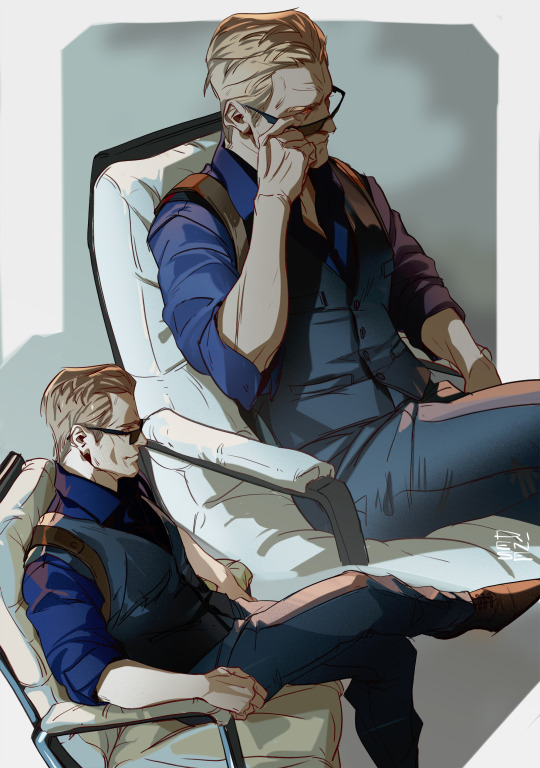
#albert wesker#re4 remake#re4 remake spoilers#spoilers#I am normal about him#I swear#IM NOT IN THE FERAL MODE FOR THIS MAN NO#you have no evidence#HHRNGHRHGHRRRRRR#FOODFINALLYRRHRHRR#spoilers tag JUST IN CASE#resident evil#my art#fanart
4K notes
·
View notes
Note
Have you heard of the "Crowley is Malleus' dad" theory going around? Where Prince Levan (or whatever his name is) didn't actually die and just went out to get some milk and is now known as Dire Crowley, the silly man? The implications of that theory is absolutely hilarious when you think about it
hold on, we can figure this out, we just need LISTS
PROS THAT CROWLEY IS SECRETLY REVAAN/LEVAN/LAVERNE/WHATEVER:
unspecified fae of some kind, with similar coloring to Mal
the animal masks are apparently a Briar Valley thing
has some kind of big blackmailable secret that was alluded to in episode 4, and then as far as I know never brought up again
(unless this was just Azul bullshitting, which is extremely possible)
based on Diablo, which...maybe means something?
has canonically worn Dad Shorts
CONS:
(gestures to Crowley's entire personality)
NO LISTEN Revaan was the guy they sent off on diplomatic missions and to take care of delicate political situations, and...look, I love this dweeb, but would you trust Crowley to be in charge of negotiating your war treaties
despite my brain insisting on reading his name as "Raven", Revaan's title does imply that he was also a dragon (or super into longan berries, I'm not ruling that out)
currently unclear why Lilia "my closest friend Revaan...he is no longer with us...I used to make fun of him for being kind of a priss about eating jerky..." Vanrouge has somehow not noticed or said anything
Malleus' Aloof Anime ~Aristocrat~ vibe had to come from somewhere, and by all accounts it was NOT his mom's side of the family
???:
turns into a bird in the opening, I don't know if that means anything but it's kinda cool, I guess
all that aside, if Malleus and Yuu are any indication, then the Draconias have...questionable taste in their social choices. so anything is possible!
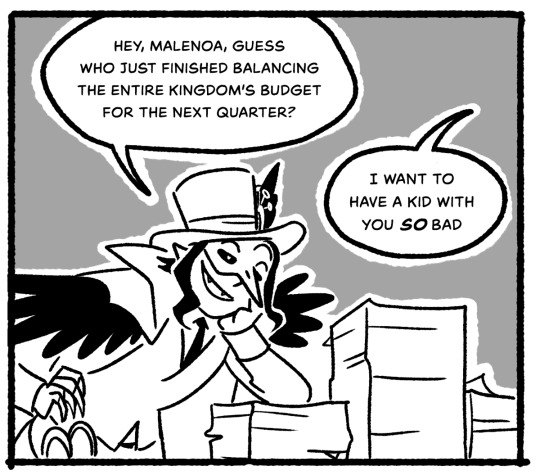
#art#twisted wonderland#twisted wonderland spoilers#twisted wonderland episode 7 spoilers#twisted wonderland book 7 spoilers#disclaimer that this is half joke and half speculation so like. please take it in good spirits and don't yell at me#right now i'm leaning away from crowley being revaan because i think the evidence is currently circumstantial at best#but who knows what the future will bring!#man. whenever i consciously remember that crowley is diablo it also reminds me#that his name is supposed to be pronounced like dear and not like the word dire#which always fucks me up a little bit. this is the worst thing about him bar none.#damnit crowley#anyway every time a new part comes out i rewatch the opening just in case there turns out to be any more foreshadowing#(there never is)#(but that ONE really quick bit where you can see overblot azul means i always have to look)#which is to say i have been carefully reanalyzing all the crowley bits and i have reached the conclusion#that i still have no idea what is going on with him#he may be the world's biggest mastermind or the world's biggest idiot and these are not mutually exclusive#(this is a strictly pro-crowley post btw)#(i'm allowed to make fun of him because i love him dire-ly)
2K notes
·
View notes
Text
also in the face of people deleting their blogs, that's another reason why you guys are supposed to reblog stuff. if somebody deletes a post, your liked version will disappear, but the reblogs remain. i'm insane about preservation and archival, every single piece of art i have ever enjoyed is reblogged on my 450k+ posts main account so if the artists leave I still have their work. i even tag things (though just with the main fandom tag) so I have years and years worth of fanworks saved that the terrible general site search will never show you.
please reblog art. not just to support the artists who make it and share their efforts, but also so you have your own copy of their works saved for yourself, and the future users of this site.
#reblog art#artist support#so basically if you dont reblog art i do not want to hear you complaining about your fav artists deleting and leaving lol#if you used this site like you were supposed to it would be at least Slightly less of an issue because you'd still have it all#save the shit you like!!! i never delete my art personally but i Want my art to be out there. just in case something happens to my blog#save my art. save everything. just dont upload it to entirely different websites like instagram cuz that makes u a prick#if your favorite artist deletes tomorrow. what evidence do you have that they were here at all?#reblog. for the love of god reblog#i lost so much great art from deviantart thanks to eclipse and the Al bullshit that i didn't save. but on tumblr i dont have to worry abt i
639 notes
·
View notes
Text
im sure this has been done soooo many times but gffa au where anakin goes to the jedi council and fesses up to being married and they immediately think he means to obi-wan and he thinks they understood that it's to padmé
("how old were you when you got married?"
"Nineteen, just after I became a Jedi Knight. I wasn't a padawan anymore!"
"Consensual, was it? Feel pressured, did you?"
"Not at all! I had to do the convincing. I really begged, for like. an embarrassingly long amount of time. I wanted this marriage more than anything in the entire galaxy."
"Has this marriage affected your reasoning during the war?"
"no way! We have the same principles, fight for the same things. Now I'm just fighting to come home as well so we can be together again.")
and anakin doesn't realize this until obi-wan gets back from a mission, does his debrief with the council, and comes to anakin's quarters with the strangest look on his face. "padawan, why did six members of the Jedi Council just wish me congratulations on my nuptials? to. my. former. padawan."
and anakin is gobsmacked and goes about trying to set the record straight, but now no one believes that he isn't married to obi-wan. they think padmé has agreed to be the cover-up because obi-wan got pissy that anakin told the council before he felt ready.
and to top it all off, now anakin can't stop thinking about actually being married to his master. he hadn't realized that was an option?? but everyone's making some pretty strong cases for it......
#kit's silly lil aus#obikin#all the jedi are just like yeah youre obsessed with him of course you begged to marry him#and he's obsessed with you of course he gave in and said yes when you were a knight#whats not making sense here#meanwhile anakin is having a meltdown over it#everyones finding evidence for their case and it's compelling!!#padme found it funny at first but its less funny as it goes on#and she starts realizing that anakin is taking it sorta maybe way too much to heart#in the worst way#also obi-wan has not made eye contact with anakin in like 3 weeks anakin is about to lose his shit
804 notes
·
View notes
Photo
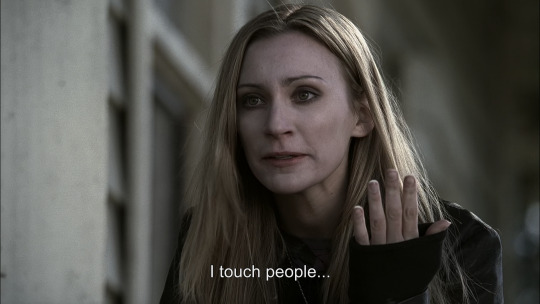




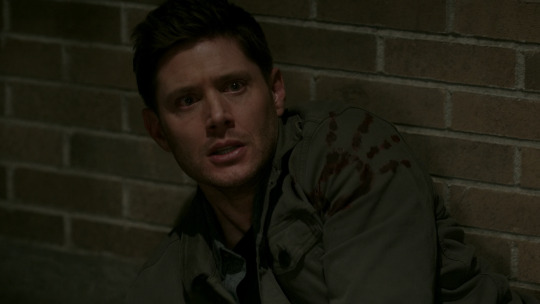
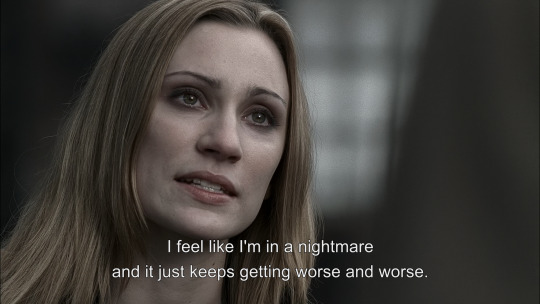

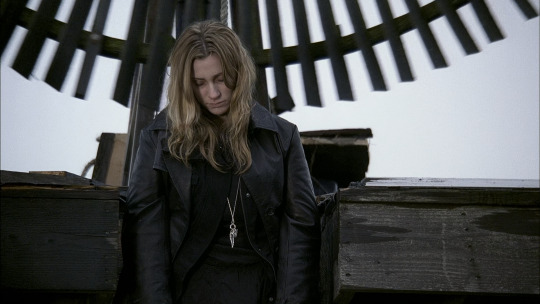

2x21 All Hell Breaks Loose (Part 1) // 7x21 Reading Is Fundamental // 15x18 Despair
#rewatching is so fun everythings foreshadowing i hate it#another piece of evidence in the deans-death-was-bury-your-gays case#supernatural#dean winchester#lily baker#destiel#deancas#spn#spn 2x21#spn 7x21#spn 15x18#my posts
2K notes
·
View notes
Text
Say what you will about the DC timeline but we all know the truth, Jason Todd uses AO3 and has an account despite not understanding these new fangle technological advancements (hes fucking with Tim he understands what cookies are, it pisses off Tim more than anything else Jason has done)
#jason todd#tim drake#batfam#look I just think that Jason would use the ''I was dead when this was made'' excuse to get out of being forced to join a GC#and then it kind of snowballed into him not understanding what an ''email'' is#despite the fact that Talia def showed him and taught him everything he needed to know including technology#now hes just fucking with Tim while updating his 500K ao3 masterpiece fanfic that Tim has no evidence is real#only Babs knows and Tim is desperately trying to find evidence its the only case that Tim is literally failing at#Dick keeps bugging Tim in showing Jason how to use the computer upstairs and Jason somehow breaks Tim's phone. Twice.#Damien also catches on and does it to Tim too but it backfired in Dick trying to teach him instead#now hes also stuck in doing it#Its a whole ass shitshow that Bruce doesnt even know is happening until Jason uses the batcave computer and Tim fucking tackles him#while screeching about evidence#Bruce calls up harley afterwards to ask if she would be willing to do sessions with RR#its a whole thing
225 notes
·
View notes
Text
Dazai would let the world burn for Chuuya
Chuuya would burn the world for Dazai
Skk soulmatism wins again
#and ill even cite my evidence#see Stormbringer and Beast#i rest my case#🙂↕️#bungou stray dogs#bsd#dazai osamu#bsd chuuya#bsd dazai#chuuya nakahara#dazai#soukoku#beast soukoku#teen soukoku
167 notes
·
View notes
Text
it's honestly very simple; i will always always always rather run the risk of accidentally supporting a liar than accidentally supporting a rapist because one of these crimes is not like the other.
#ignoring all the statistical evidence of false rape cases being highly uncommon and all that.#bc i just don't hate women like some of u all#p#feminism
1K notes
·
View notes
Text
Cannot stop thinking about an au where Turnabout Trump doesn't happen/happens but Olga is convicted instead so Apollo is still working at the Gavin law offices for his first few cases. He meets Trucy at one of the crime scenes and she tags along on his investigations, but she doesn't tell him about her connection to Phoenix until after their first case together. Ema likes Apollo less at first bc she doesn't like the fop and you work for his brother, who she also hates bc he's very condescending when he cross examines her in court.
When you meet Klavier in the second case you can ask Kristoph about him and vice versa. They don't interact with each other but you get to learn some more things about the brothers, their opinions on each other and their backstory. You also find out that Klavier was the one who got Phoenix disbarred and Kristoph is apologetic about it, given that Phoenix is his "friend" (though they haven't interacted at all since phoenix was found not guilty).
At one point Trucy is visiting Apollo at the Gavin Law Offices when Kristoph returns and "politely" kicks her out. She then reveals to Apollo who the daddy she keeps talking about actually is. You get to meet Phoenix again in the next case and find out more about the incident 7 years ago.
Over the course of the game you/Apollo starts to grow more suspicious of Kristoph and his intentions, alongside a growing sense of horror that you got an innocent person convicted in your first case. It all comes to a head in Succession when Drew Misham finally uses the stamp, which turns up fixed to a letter in the Gavin Law Offices postbox that Apollo collects on his way in one morning. You hand it to Kristoph and he promptly disappears with it, feigning excuses. Phoenix uses this case to finally spring his trap and test the jurist system. Kristoph gets the double whammy of his brother and mentee turning on him at once and the murder of Shadi Enigmar is properly resolved. It's also revealed that Trucy started tagging along on Apollo's investigations to collect intel for Phoenix.
At the end of Succession, Apollo is offered a role at the newly-renamed Wright Anything Agency and there's a final rise from the ashes-style case that serves as Apollo's first proper case as an official WAA employee and helps tie up some loose threads/lets the characters deal with the fallout of Succession.
Idk I just think it'd be fun/satisfying to realise slowly that there's more to everything than meets the eye.
#yeah im using you/apollo interchangeably bc both are applicable#idk i just think itd be really fun#plus you'd get more history for the gavin brothers and who doesnt want that?#ace attorney#apollo justice#kristoph gavin#klavier gavin#trucy wright#phoenix wright#how did olga end up getting convicted in turnabout trump? who knows!#maybe phoenix chose not to forge evidence to implicate kristoph#maybe trucy wasnt able to deliver it#i feel like the second and third cases would still be Corner and Serenade but adapted#maybe switched round so serenade is first and corner is second#so you meet klavier after theres a murder at his concert and he returns to prosecution to find out which of his friends/colleagues#is the culprit#and then you meet phoenix in the third case after his incident with the car
183 notes
·
View notes
Text

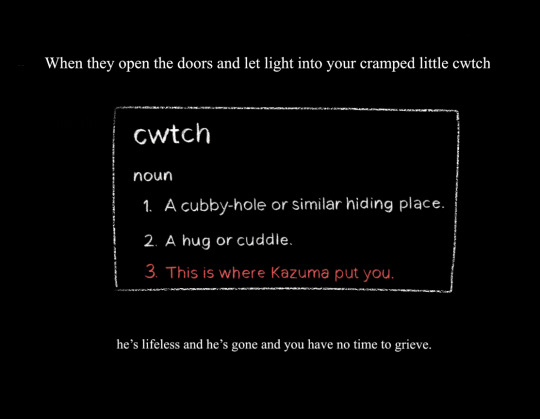
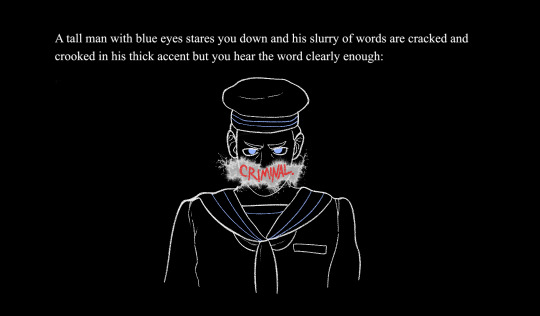



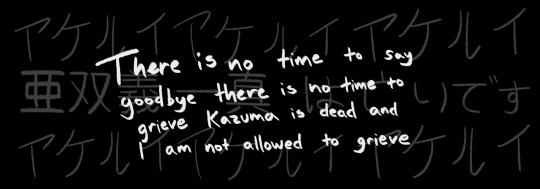
he didn’t do it
#ace attorney#tgaa#the great ace attorney#im not finished with case two yet I just have a lot of feelings about the intro chapter. evidently.#id in alt#ryunosuke naruhodo#kazuma asogi#asoryuu#tgaa spoilers#poetry#comic#ish?#dgs
207 notes
·
View notes
Text
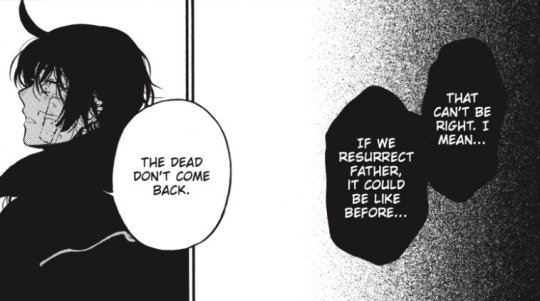
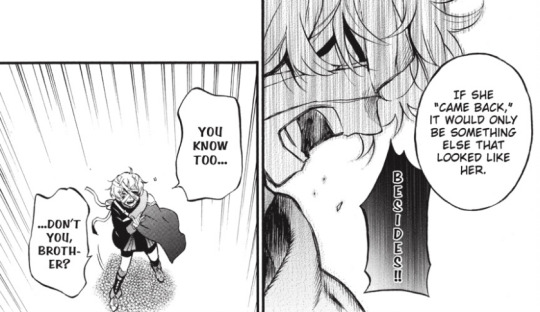
Since writing my last post about how Vanitas understands "salvation" as the preservation of one's self, even at the price of death, I've been thinking about how that plays into Vanitas's thoughts on resurrection. It's only two short lines, but I find the view he expresses in this scene absolutely fascinating.
Vanitas tells Misha that the dead "don't come back," and the fact that he phrases it that way stands out to me. He doesn't say that resurrection is impossible on a physical level; he implicitly concedes that maybe Misha could "bring back" something that looks and acts like Luna. He doesn't quibble about the practicalities of reanimating someone whose body turned to ashes or bring up whatever concept of the afterlife he may have.
Instead, Vanitas says that a resurrected Luna would simply be "something else that looked like her." A resurrected Luna would lack some fundamental part of whatever it was that made Luna who they were in their first life.
But what would they lack? I don't think he's implying that a resurrected Luna would lack their soul—not really. Setting aside the absence of souls as a conceptual presence in VnC, I think that would be too concrete and specific for what Vanitas is gesturing toward. Rather, he's conceiving of the Self in a somewhat ineffable way. On a metaphysical level, a version of Luna brought back from the dead simply Wouldn't Be Her, and he can't put it in more concrete terms than that.
So why does he think this way?
I think the concept of resurrection is awful enough to Vanitas that he has to reject it outright for his own stability. He cannot even slightly entertain the notion that resurrection might be possible, because that would destroy one of his main coping mechanisms.
Resurrection is nightmarish to a man that relies on death as an escape. Vanitas is suicidal, but beyond his self-hatred, his relationship to death is very particular. He's someone whose body and being has been corrupted and violated several times—through violence, through experiments, and through Luna's bite, and he's desperate to retain control of himself in the aftermath. He's desperate for control in regards to everything in his life, but especially his body and his death.
Vanitas is being slowly transformed into something inhuman, and he plans to die someday to escape that fate. The idea that after he's gone, someone could override that decision and force him back into living a life he doesn't want must be unacceptably horrific to him. He dismisses it out of hand because he has to.
Vanitas says a resurrected Luna would, on some level, not really be Luna. Whatever comes back might look like them, but it would lack some fundamental self that makes Luna "Luna." Thus, if Vanitas himself were ever "resurrected" after his death, it would be the same. Death remains an absolute escape for him, and even if someone contrives to bring back something that looks like him after he's gone, it won't be him. That life won't be his problem.
In addition to whatever beliefs Vanitas might have about death and afterlives the feasibility of resurrection, I think this is a key part of his relationship to the concept. He lives his life knowing that death waits for him as an escape valve. He needs that looming death as his salvation. Thus, faced with the concept of resurrection, his argument basically boils down to "nuh-uh." He shoots down the concept and declares that a resurrected person wouldn't be themselves in some nonspecific way, because the possibility of anything otherwise isn't something safe for him to consider.
#of course. it's not out of the question that Vanitas has actually encountered a botched resurrection before and is speaking from experience#but occam's razor and all that#or mochijun's razor:#when encountering a vanitas character trait. assume it's a trauma response until shown substantial evidence otherwise#vnc#vanitas no carte#the case study of vanitas#vanitas#vanitas my beloved#english major hours#ID in alt text#I briefly wonked up posting this but I think it's normal now
101 notes
·
View notes